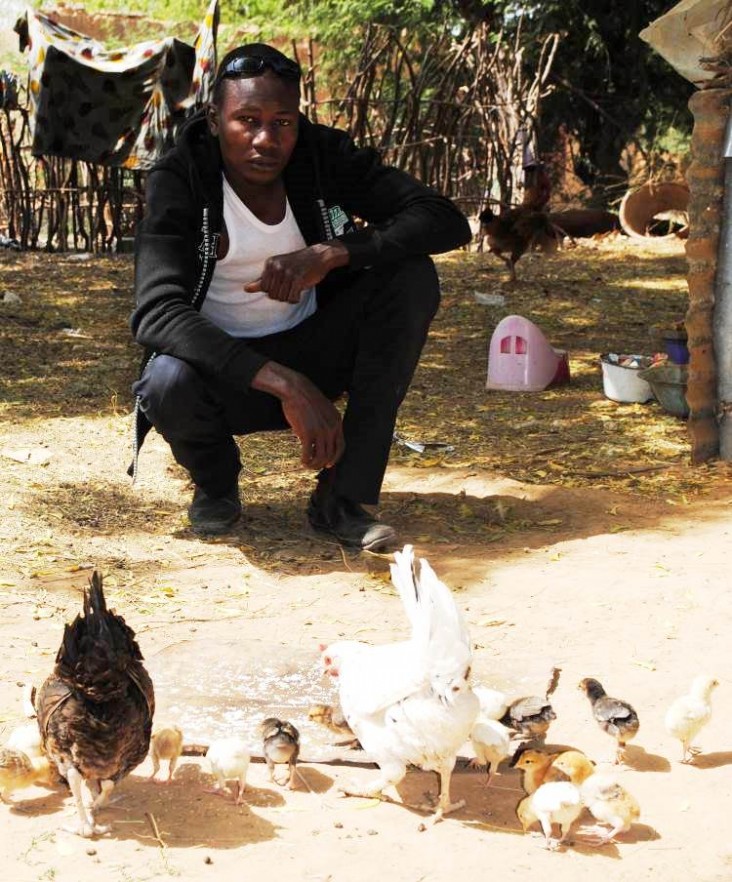
March 2015—Most of Harouna Kobor’s neighbors in northeastern Senegal make a living by herding and subsistence farming, or by remittances from their emigrant family members. But Kobor is turning profits by raising poultry.
In September 2012, USAID’s Pass on the Gift program trained Kobor, starting him off with 10 hens and two roosters. Eighteen months later, he had over 80 hens, chicks and roosters in his family compound, representing a new source of capital as well as a new source of nutrition for his family.
These crossbred Rhodes chickens are new to Kobor’s village of Ganguel Soule, where chicken is more expensive by weight than any other meat. Kobor can sell a chicken for $4-$5 (2,000-2,500 CFA francs). This price is far more impressive when adjusted for cost of living: Six chickens covered the cost of sending his children to school, and four chickens gave them new clothes for the Korité festival after Ramadan.
New chicks appeared quickly, and Kobor passed his gift of 10 hens and two roosters on to another local family in accordance with the requirements of USAID’s Yaajeende Agriculture and Nutrition Development Program. Kobor’s family eats chicken eggs every week and chicken meat once a month—both nutritious delicacies in northern Senegal. While the money from selling chickens sends his children to school and pays for their school supplies, it also serves as capital for new income-generating activities, including vegetable farming and animal husbandry.
When Kobor wanted to grow onions in his 500 square-meter family plot, he sold four more chickens to buy seeds and fertilizer to augment chicken manure. A single 40-kilogram sack of onions from his field can bring him $21, and his family plot will produce several sacks.
For the price of 10 chickens, $37, Kobor bought a sheep. After fattening it up, he can resell it for more money or slaughter it for the meat. “I want to gradually expand my business to include raising sheep,” he said.
The biggest challenge to the project was an attack of the avian pox virus, which killed many birds in the area in 2014. In response, USAID provided a follow-up training in vaccination.
“Before the training, I wasn’t in the habit of vaccinating my chickens,” said Kobor. “If they got sick, I would just put neem leaves [a traditional remedy] in their water. The trainings helped me to master the vaccination schedule and taught me how to keep the chickens clean and safe.”
With all the new chickens and more on the way, Kobor plans to expand his chicken coop. The project has grown to include more than 22 families in the community, plus women’s groups.
“USAID taught me about producing eggs and raising chicks,” said Kobor. “People in my village want to buy chickens from me, and even people from outside the village. The chickens have really changed the way we live.”
As part of the U.S. Government's global hunger and food security initiative, Feed the Future, the Pass on the Gift component of the USAID Yaajeende project provides animal grants to vulnerable families to improve food security, nutrition and incomes in four regions of Senegal as well as the department of Bakel in Tambacounda.
By its completion in 2015, the five-year Pass on the Gift project is expected to reach more than 5,500 families with animals and training. Beneficiaries, among the most vulnerable populations in selected communities, receive and breed animals such as goats, sheep and hens and produce high yields of products including milk, eggs and meat. As the animals multiply, beneficiaries pass on the same number of animals received to additional vulnerable families. As the animals multiply, thousands of new families benefit.
LINKS
Follow @usaidafrica, on Facebook, on Flickr, on YouTube







Comment
Make a general inquiry or suggest an improvement.